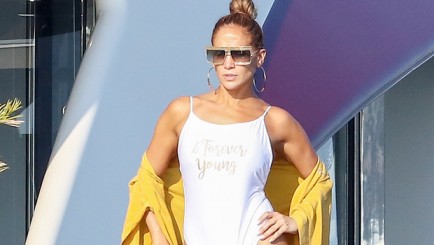Pregnancy is just the beginning of a life-long love affair with your child. The early weeks can be tiring and stressful, and it’s easy to feel a bit disconnected from your growing baby. But as your pregnancy progresses, and your bump grows, you’ll start to feel much more like a mum-to-be. To help prepare for your new life, spend a little time bonding with your unborn baby when you can. We’ve got some great tips to help you get in touch with this new little person.
1. Massage your bump
A soothing way to bond with your baby is to gently massage your belly. This is safe to do after the first three months of pregnancy, and it’s a great way to relax and wind down. Many women use oils and creams in an effort to prevent stretch marks . However, there’s very little evidence that moisturisers and creams work to prevent them. Nonetheless, smoothing on cream or oil can certainly be a relaxing ritual for you and your baby, and may help to keep your skin feeling soft and supple.
An aromatherapy massage is a great way to pamper yourself. It gives you a wonderful chance to sit still and spend time thinking of and talking to your baby. Try adding one or two drops of lavender, frankincense or ylang ylang to a carrier oil for massage. All of these oils are safe to use after the first trimester. Ask your partner if he’d like to give you a massage. It may help him to share in your pregnancymore easily.
2. Go swimming
Swimming is a great way to take the weight off your feet, and it even gives you some idea of what life is like for your baby! Not only is swimming a safe way to exercise but since your baby’s floating in fluid too, it gives you a chance to relate to her. No matter how big your bump, the gentle support of the water will give you some welcome relief in the later stages of your pregnancy. You could also look out for aquanatal classes. These are an ideal opportunity to tone up and make new friends.
3. Sing and talk to your baby
Your baby’s hearing is developing all the time. From about 23 weeks she can enjoy the daily soundtrack of your heartbeat and the growling of your hungry tummy. She’ll also start to hear sounds from the outside world. Hearing your voice while she’s still in the womb helps your baby feel attached to you quickly once she’s born. One theory suggests that the reason your baby’s hearing is so well-developed in the womb is to help her start to bond with you even before she’s born. After birth, your newborn may love to hear your voice more than any other. Talking and singing to your baby can be truly rewarding once you know she can hear you. You may feel a bit self-conscious at first but you’ll soon get used to it and enjoy having chats with your bump.
4. Have a bath
A nice long soak is the perfect way to get away from it all and enjoy some real “me time”. It’s also a great chance to devote some attention to your baby. Just make sure the water’s not too hot, as this can be bad for your baby. Run a warm bath and perhaps light some candles and play soft music in the background for a soothing ambience. Then simply lie still, breathe deeply, relax completely and picture your baby. Try taking a few minutes to visualise yourself holding her when she finally arrives. Imagine what she might look like, what you might say to her and how that first cuddle might feel. If you’re well into your second trimester, you may have already felt your baby’s movements. However, these can be easy to miss when you’re busy during the day. A nice quiet bath is the perfect time to focus on your baby’s squirming and kicking. Get to know the pattern of your baby’s movements, and imagine how big and strong she’s getting!
5. Try pregnancy yoga
Antenatal yoga classes aren’t just a fantastic way to relax. They also help you focus on the amazing work your body is doing and pay closer attention to your growing baby. If you haven’t done yoga before it’s fine to start while you’re pregnant. Yoga poses for beginners are usually quite simple. The best time to start yoga is in the second trimester, after 14 weeks. The national governing body for yoga, the British Wheel of Yoga, advises you not to try it in the first trimester. Along with gentle stretching you’ll learn breathing techniques that can help during labour. Antenatal yoga can help to relax your mind and body and may make you feel more in touch with your baby. Watch our yoga videos for ideas of poses that may suit you.
6. Practise hypnobirthing
Hypnobirthing classes are designed to help you stay calm and in control during labour and birth. The techniques used can also help you to eliminate distractions and focus on your body and your baby. You’ll have to pay for hypnobirthing classes, but you may find the deep relaxation techniques you learn there help you connect better with your baby. If hypnobirthing isn’t for you, you could visit a trained hypnotherapist instead. A good hypnotherapist will teach you how to use breathing and concentration techniques to tune out distractions and concentrate on your baby.
7. Keep a scan picture of your baby close by
A picture of your baby’s scan on your phone or on your fridge door is a constant reminder that your bump is home to a little person. Your first scan will probably be a dating scan at around 10 weeks to 13 weeks plus six days of pregnancy. Not all hospitals will offer you a picture of the scan to take away, but do ask if you can have one, as it can help you to visualise the little person developing inside you. If your NHS hospital doesn’t offer the service, you may want to pay for a private scan instead. You may well be wondering whether you’re having a girl or a boy, however you’re unlikely to find out at this stage. You may be told at your anomaly scan between 18 weeks and 20 weeks plus six days of pregnancy. You could also arrange a private 3D or 4D scan later in pregnancy. These scans can give you a clear view of your baby’s features. You may even be able to tell whose nose she’s inherited! The best time to have a 3D or 4D scan is between 26 weeks and 30 weeks of pregnancy. Private scans can be expensive but seeing what your baby looks like may make prospective parenthood seem more real for you and your partner.
8. Help daddy bond too
Most mums-to-be experience some pregnancy symptoms in their first trimester. This daily physical reminder of pregnancy may help you bond with your unborn baby from the start. Although dads-to-be don’t have this physical experience, there are still plenty of ways to help your partner bond with your baby as your pregnancy progresses. Help the dad-to-be to feel your baby move. Once you’re 23 weeks pregnant, let him know that your baby can now hear sounds outside your womb (uterus). Encourage him to talk and read to your bump. This will help your baby become familiar with her daddy’s voice. Encourage your partner to attend antenatal classes with you so he knows what to expect during labour and birth. Both dads-to-be and the partners of pregnant women have a legal right to take unpaid time off to attend up to two antenatal appointments. Raising a child takes teamwork, and the sooner you and your partner learn to work together, the better. There’s plenty he can do to help, from taking on a few extra chores to running you a nice relaxing bath. This may help you both to feel that you’re in this pregnancy together!
9. Go for a walk
Try taking some time out to bond with your bump by going for a walk. It’s great exercise and easy to fit into your daily routine, even if you’re working. Going for a stroll gives you space to think about your baby without too many distractions or interruptions. You can even have a discreet chat with your bump as you go. If you didn’t do much exercise before you became pregnant, start with a gentle stroll at a pace that’s comfortable for you. Once you’ve got into the habit of walking regularly, you can build up to faster walks lasting between 20 minutes and 30 minutes. You could alternate a few minutes of brisk walking with a few minutes at a slower pace.
10. Respond to your baby’s kicks
You may start to feel your baby’s movements from about 18 weeks to 20 weeks if this is your first baby. Feeling your baby move can be wonderfully reassuring after weeks of having no idea what she’s getting up to in there! Responding to your baby’s kicks is about as close as you will get to two-way communication before she’s born. And you can do it at any time, wherever you are. Rub your bump when your baby moves and you may find that she kicks back at you. There’s nothing quite as exciting as feeling your baby respond to your touch for the very first time.
Original article: https://www.babycentre.co.uk/a1049630/10-ways-to-bond-with-your-baby-bump




























Comments